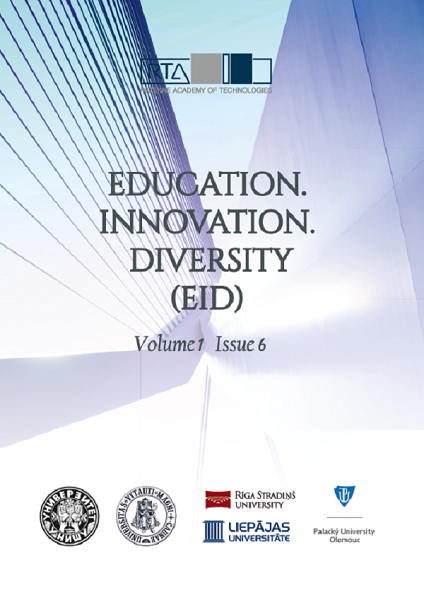A NEW DEVELOPMENT MODEL OF SUSTAINABLE COMMUNICATION FOR HIGHER EDUCATION INSTITUTIONS
DOI:
https://doi.org/10.17770/eid2023.1.7175Keywords:
data, higher education institutions, information, knowledge, model, sustainable communication, sustainabilityAbstract
Higher education institutions are the important chain in provision of the inter-connections between the workforce (school graduates, youth, or adults), representatives from different economic sectors, experts from research and innovation development organisations, and all the interested contributors. The research purpose is to build a new development model of sustainable communication for higher education institutions. This research is qualitative as it aims at constructing a new model. The research integrates the use of theoretical analysis, comparative analysis of existing models, theoretical modelling, model creation, summarising analysis. Very often the researchers think of the process of communication as a one-way process. The present work allowed for the establishment of the inter-connections between the development of the system of the external and internal perspectives, on the one hand, and the implementation of the process of sustainable communication, on the other hand. The novel contribution of this research is that the sender and the receiver of the information in the sustainable communication process act at the same time, their information meets and exchanges, thereby promoting information interaction or quasi-knowledge creation. Future research intends to include the empirical methods of research. Collection of quantitative data is a future research direction, too.
References
Ahrens, A., Purvinis, O., Zaščerinska, J., & Andreeva, N. (2015). Use of Webinars in Higher Education: Quasi-Group Decision Making in Higher Education: A Model for Analysis of BinaryStudents’ Behavior. A paper presented at the 3rd annual international scientific-practical application conference Trends in Science and Higher Education Studies Under Conditions of Globalization. Panevezys College, Panevezys, Lithuania). 22-23 October 2015
Ahrens, A., Purvinis, O., Zaščerinska, J., & Andreeva, N. (2016). A Model for Simulation of Study Process Optimization in Rural Areas. Proceedings of the 9th International Scientific Conference "Rural Environment, Education, Personality - REEP-2015". Volume 9, 13th - 14th May, 2016, LLU, Jelgava, 145-152. Retrieved from http://llufb.llu.lv/conference/REEP/2016/Latvia-Univ-Agricult-REEP-2016proceed2255-808X.pdf.
Ahrens, A. & Zaščerinska, J. (2012). Perspective of Game Theory in Sustainable Development. In: Stasys Vaitekunas (Ed), Proceedings of ATEE Spring University 2012 Conference 20 Years of Sustainable Development: Learning from Each Other, pp. 99-108. Klaipeda: Klaipeda University.
Ahrens, A., Zascerinska, J., & Aleksejeva, A. (2021). Fostering External and Internal Sustainability within the English for Academic Purposes Course in the Covid-19 Pandemic. Education. Innovation. Diversity, 2(2), 6-15. DOI: https://doi.org/10.17770/eid2021.1.5412
Ahrens, A., Zaščerinska, J., Amanzholova, S., Aleksejeva, L., Zaščerinskis, M., Aleksejeva, A., Gukovica, O., & Abjalkiene, I. (2021). A Multi-sided Needs' Analysis for Designing a Master Programme in the Field of Information Technologies at a University in Kazakhstan. In: Scientific printed works of the Conference 10-th International Scientific Conference «Perspectives of Economic of Kaliningrad Region and EU Development»,, 23-25 of June 2021, pp. 9-12..
Ahrens, A., Zaščerinska, J., & Andreeva, N. (2013). Engineering Students‘ Blended Learning in Higher Education. Proceedings of International Scientifical Conference Society, Integration, Education, Volume 1, 34-44..
Ahrens, A., Zaščerinska, J., Lange, C., & Aļeksejeva, L. (2021). "A Comparative Analysis of Processes of Conceptual Change for the Enhancement of Implementation of Green Energy Education and Training," International Journal of Information and Education Technology (IJIET) vol. 11, no. 1,. 47-51, DOI: https://10.18178/ijiet.2021.11.1.1488
Blunden, A. (2009). An Interdisciplinary Concept of Activity. In: A. Blunden (ed.), Outlines Nr. 1 2009, 1-26. Taylor & Francis Group. Retrieved from http://lchc.ucsd.edu/MCA/Paper/
Elving, Wim JL. (2020). Sustainable Communication. Mini Review, Int J Environ Sci Nat Res, Volume 26 Issue 3 - November 2020. DOI: https://10.19080/IJESNR.2020.26.556190
Emas, R. (2015). The Concept of Sustainable Development: Definition and Defining Principles. Brief for GSDR 2015. Global Sustainable Development Report, United Nations.
European Commission, Secretariat-General (2018). European pillar of social rights, Publications Office, 2018. DOI: https://data.europa.eu/doi/10.2792/95934
Ferreira, J. R. (2008). Geography of the Information Society. In G. Putnik & M. Cruz-Cunha (Eds.), Encyclopedia of Networked and Virtual Organizations (pp. 635-642). IGI Global. DOI: https://doi.org/10.4018/978-1-59904-885-7.ch084
Fetting, C. (2020). “The European Green Deal”, ESDN Report, December 2020, ESDN Office, Vienna
Kalpana, M. & Kumar, A. V. (2020). Fuzzy Expert System in Agriculture Domain. In A. Kumar & M. Kalpana (Eds.), Fuzzy Expert Systems and Applications in Agricultural Diagnosis (pp. 1-15). IGI Global. DOI: https://doi.org/10.4018/978-1-5225-9175-7.ch001
Kemp, T. E., Butler-Henderson, K., Allen, P., & Ayton, J. (2021). Evolution of the Health Record as a Communication Tool to Support Patient Safety. In C. Chisita, R. Enakrire, O. Durodolu, V. Tsabedze, & J. Ngoaketsi (Eds.), Handbook of Research on Records and Information Management Strategies for Enhanced Knowledge Coordination (pp. 127-155). IGI Global. DOI: https://doi.org/10.4018/978-1-7998-6618-3.ch008
Kühne, T. (2004). What is a model? Dagstuhl Seminar Proceedings 04101. Retrieved from http://drops.dagstuhl.de/opus/volltexte/2005/23 https://www.researchgate.net/publication/30814656_What_is_a_Model
Lasmanis A., Sporāne B., Pakalne D., Kalniņa I., Mukāne Dz., Hofmane L., & Mauliņa A. (2008). „Mūžizglītības aktuālās problēmas un bibliotēku loma zināšanu sabiedrība”, Rīga, Datorzinību centrs.
Leont’ev, A. N. (1978). Activity, Consciousness, and Personality. Prentice-Hall. 8 p. Retrieved from http://marxists.org/archive/leontev/works/1978/ch5b.htm
Llopis-Lorente, A., Díez, P., Sánchez, A. Marcos, M.D., Sancenón, F., Martínez-Ruiz, P., Villalonga, R., & Martínez-Máñez, R. (2017). Interactive models of communication at the nanoscale using nanoparticles that talk to one another. Nat Commun 8, 15511 (2017). DOI: https://doi.org/10.1038/ncomms15511
Sedkaoui, S. (2019). Big Data, Who Are You?. IGI Global. DOI: https://doi.org/10.4018/978-1-5225-7609-9.ch001
Sitarov, В. А. (2004). Didactics. Academia.
Tiļļa, I. (2003). Pusaudžu sociālkultūras kompetences pilnveide otrās svešvalodas mācību procesā. Promocijas darba kopsavilkums. Latvijas Universitāte. Rīga: Latvijas Universitāte, Latvija. 48 lpp. (in Latvian).
Wells, G. (1994). Learning And Teaching "Scientific Concepts". Vygotsky's Ideas Revisited. Moscow, September 1994. Ontario Institute For Studies In Education. University Of Toronto. 10 p. Retrieved from http://education.ucsc.edu/faculty/gwells/Files/Papers_Folder/Scient.concepts
Zaščerinska, J. (2013). Development of Students’ Communicative Competence within English for Academic Purposes Studies. Verlag: Mensch & Buch.
Zelinski, J. (2020). Synthesis of MOF, MDA, PIM, MVC, and BCE Notations and Patterns. In Z. Altan (Ed.), Applications and Approaches to Object-Oriented Software Design: Emerging Research and Opportunities (pp. 78-89). IGI Global. DOI: https://doi.org/10.4018/978-1-7998-2142-7.ch003






